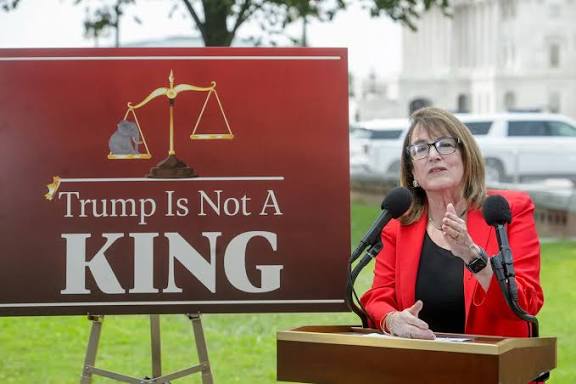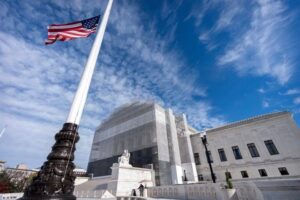Supreme Court Warning: Retired Judges Say Rule of Law Is Failing in America

In interviews, former state and federal judges have warned that the guardrails of democracy may already be weakening as the rule of law begins to falter. Today we will discuss about
Supreme Court Warning: Retired Judges Say Rule of Law Is Failing in America
Across the United States, a growing chorus of retired judges—many of them lifelong guardians of the Constitution—are sounding an unprecedented alarm: the rule of law in America is weakening. These judges, freed from the constraints of the bench, have stepped forward to warn that legal norms, judicial independence, and democratic safeguards are deteriorating at an alarming pace.
Their message is sharp and unified: America is approaching a constitutional breaking point. The separation of powers is straining, political interference in the judiciary is growing, and the public’s faith in impartial justice is eroding. These warnings, once rare and reserved for extreme circumstances, have now become frequent and urgent.
The question looming over the nation is no longer abstract: Can American democracy survive without a fully independent judiciary?
What Judges Are Warning About

1. Procedural Shortcuts and the Rise of the “Shadow Docket”
One of the most consistent concerns raised by retired judges is the Supreme Court’s increasing reliance on rapid, emergency rulings—often issued without full hearings, detailed evidence, or written opinions. These fast-tracked decisions, sometimes called “shadow docket” rulings, do not go through the normal judicial process.
Judges argue that:
Emergency orders are being used for issues that are not genuine emergencies.
Decisions are made with limited briefing and no oral arguments.
The Court often gives no explanation, leaving lower courts and the public in the dark.
Historically, emergency rulings were rare and reserved for life-or-death situations. Today, they are shaping major policies on immigration, elections, labor rules, and executive power.
Retired judges warn that when the Supreme Court bypasses seasoned judicial processes, transparency collapses, legal reasoning evaporates, and the usual checks on power weaken.
2. Political Attacks and Intimidation Against Judges
Another serious warning involves the increasing hostility aimed at judges—particularly when their decisions conflict with political interests. Judges at every level report a dramatic escalation in:
public harassment
online threats
doxxing
attempts at intimidation
political figures personally attacking judges by name
Some judges have even had to relocate their families for safety.
Retired judges say this hostile climate creates a chilling effect. When judges fear retaliation for impartial rulings, judicial independence becomes an illusion.
Even more concerning, potential judicial nominees are declining to serve because they do not want their families exposed to threats or political persecution. This raises fears of a future judiciary that is weaker, more politically compliant, or less willing to make bold, principled decisions.
3. Declining Institutional Respect for Court Decisions
Several former judges have expressed deep concern that political leaders increasingly treat court rulings as optional or merely advisory. In a constitutional democracy, the judiciary has no army—it relies entirely on public trust and voluntary compliance with court orders.
When officials openly challenge or undermine court rulings, it sends a message that the rule of law is negotiable. Retired judges warn that:
Disregarding court orders sets a dangerous precedent.
It encourages executive overreach.
It erodes public faith that the law applies equally to everyone.
It normalizes behavior common in authoritarian systems.
For a nation built on a system of checks and balances, this trend is a direct threat to constitutional stability.
Major Figures Speaking Out
These warnings come from judges across ideological lines—liberal, conservative, and moderate alike. Several high-profile former jurists have publicly stated that the United States is entering uncharted territory.
Some of the themes they highlight include:
The courts must remain co-equal to the executive and legislative branches.
Lifetime appointments were created to shield judges from political pressure — not make them immune to accountability.
Public understanding of judicial independence is fading.
One retired Supreme Court justice emphasized that democracy cannot survive “on autopilot” and that citizens must remain vigilant and informed.
Another longtime federal judge—appointed by a conservative president—resigned early specifically to speak out, saying he could no longer remain silent while observing open hostility toward legal norms and the judiciary.
Their unified message is simple: the erosion of judicial independence is not theoretical. It is happening now.
Why Judges Say the Rule of Law Is at Risk
1. A Surge in Executive Power
Retired judges note that recent presidents of both parties have increasingly tested constitutional boundaries. But several say the problem has accelerated dramatically in recent years, with the executive branch frequently:
bypassing traditional legal review
issuing sweeping orders without judicial clarity
leveraging emergency powers aggressively
portraying judges as political enemies when rulings do not go their way
Judges warn that as executive power expands without meaningful checks, the Supreme Court becomes the last barrier to authoritarian drift—and that barrier is currently under strain.
2. Reduced Transparency and Public Understanding
The judiciary is already the least visible branch of government. Unlike Congress or the presidency, it operates slowly, quietly, and methodically. But when the Court increasingly issues rulings without explanation or public rationale, the public cannot understand how decisions are made.
A system that relies on trust becomes unstable when transparency fades.
3. Threats Affecting the Recruitment of Future Judges
If judges fear for their careers or personal safety, fewer qualified individuals will seek judicial appointments. Retired judges have warned that:
Fewer experienced lawyers want to become judges.
The bench may be filled with more politically loyal — not necessarily more qualified — candidates.
This could permanently alter the character and quality of the American judiciary.
This shift would not be easily reversible.
Potential Consequences for American Democracy
If the warnings from retired judges continue to go unheeded, the country could face long-term and potentially irreversible consequences.
1. Civil Rights and Liberties May Become Less Secure
Without robust judicial review, laws affecting minority rights, immigration, labor protections, and voting access could be subjected to rapid, politically motivated changes. A weakened judiciary would struggle to enforce constitutional safeguards.
2. Legal Precedent Could Erode
Without reasoned opinions, future courts cannot rely on established precedent, creating legal chaos. Judges warn that rushed, unexplained decisions could eventually result in:
contradicting rulings
inconsistent legal standards
weakened protections for civil liberties
3. Judicial Legitimacy Could Collapse
The courts rely on respect, not force. If the public begins to see judges as political operatives rather than impartial arbiters, the entire justice system could lose its authority.
4. Increased Executive Overreach
A weakened judiciary allows unchecked executive power. Judges point out that this is a hallmark of democratic backsliding around the world.
What Reforms Judges Are Calling For
Retired judges are not simply issuing warnings—they are proposing solutions to strengthen judicial independence.
Some of the most common recommendations include:
1. Greater Limits on Emergency Rulings
Many judges advocate reforms to ensure emergency decisions are used only when absolutely necessary and are accompanied by written explanations.
2. Strengthening Judicial Security
Retired judges urge increased funding and structural security protections for judges across all levels, not only the Supreme Court.
3. Enhanced Transparency
Judges argue that the Supreme Court should publish full opinions—even in emergency cases—and disclose votes to maintain trust and accountability.
4. Term Limits or Structured Tenure
Some former judges and constitutional scholars support term limits for Supreme Court justices, arguing that this could reduce the perception of political entrenchment.
5. Public Education and Civic Literacy
Many judges say Americans must better understand the judicial system—what it does, why it matters, and how it protects freedom. Without informed citizens, even strong institutions can fail.
Why This Moment Is Different
Retired judges have expressed concerns before—but never with this intensity, unity, or frequency. Several factors make this moment historically significant:
The rapid rise in emergency rulings
An unprecedented level of public threats and harassment
Growing political interference in judicial matters
Declining willingness of qualified individuals to serve
Deepening polarization across the nation
Taken together, they form what many judges describe as a “perfect storm” threatening the constitutional order.
A Warning Not Just for America, but the World
Democracies around the globe look to the United States as a model of judicial independence. When that independence is threatened, it sends a message far beyond U.S. borders.
Retired judges caution that:
Authoritarian leaders worldwide may feel emboldened.
International confidence in American institutions could weaken.
Human-rights norms may suffer globally if the U.S. loses moral authority.
America’s legal system has long been a beacon of stability; its weakening affects more than just one nation.
Conclusion: A Constitutional Crossroads
Retired judges from across the country—liberal, conservative, and centrist—are issuing the same grave warning: America is at a turning point. The independence of the judiciary, the strength of the Constitution, and the integrity of the rule of law are under real and immediate threat.
Their message is neither partisan nor exaggerated. It is a call to defend the foundational principles upon which the nation was built. Judicial independence does not erode all at once; it weakens slowly, silently, and often without public awareness—until it is too late.
To preserve the rule of law, Americans must recognize the urgency of this moment and take steps—legal, political, and civic—to ensure that the courts remain strong, fair, and free from intimidation or political capture.
How useful was this post?
Click on a star to rate it!
Average rating 0 / 5. Vote count: 0
No votes so far! Be the first to rate this post.
About the Author
usa5911.com
Administrator
Hi, I’m Gurdeep Singh, a professional content writer from India with over 3 years of experience in the field. I specialize in covering U.S. politics, delivering timely and engaging content tailored specifically for an American audience. Along with my dedicated team, we track and report on all the latest political trends, news, and in-depth analysis shaping the United States today. Our goal is to provide clear, factual, and compelling content that keeps readers informed and engaged with the ever-changing political landscape.




